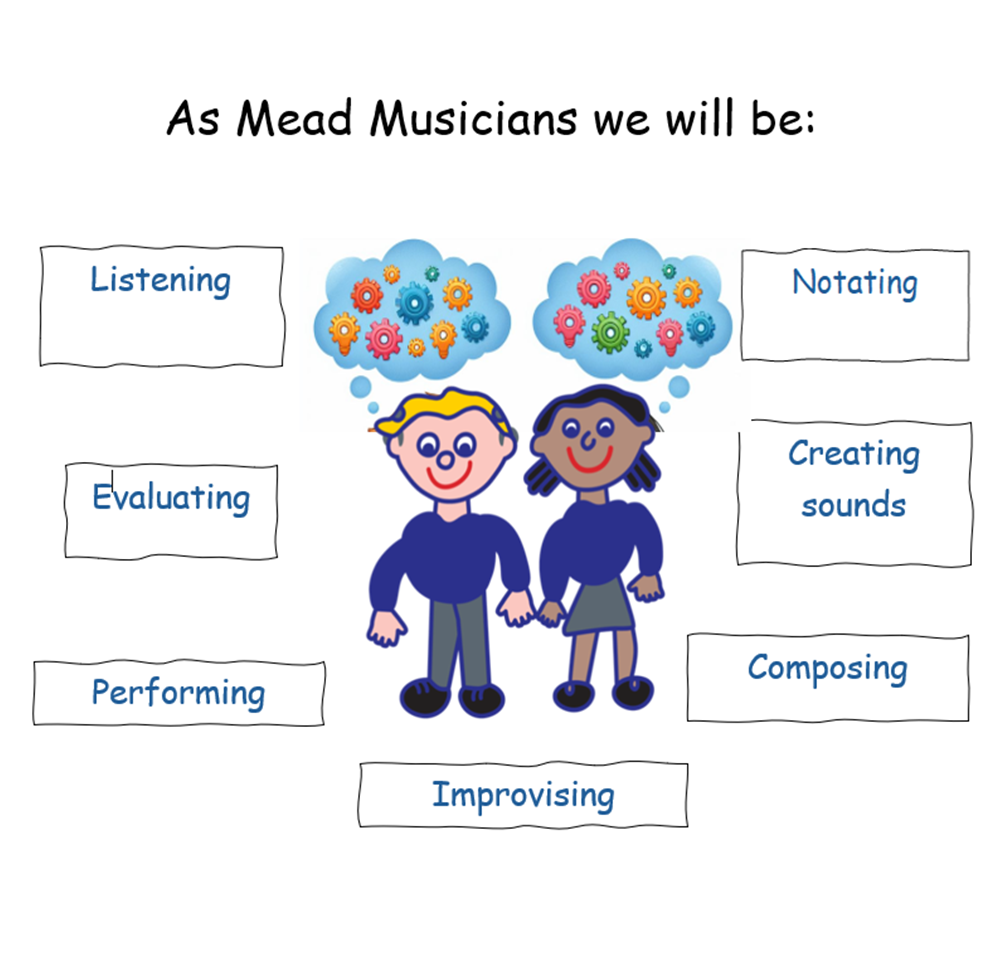Music
Intent

At The Mead Infant and Nursery School Infant School we want our children to feel that they are musical, and to develop a life-long love of music and to realise their full musical potential.
We focus on developing the skills, knowledge and understanding that children need in order to become confident performers, composers, and listeners. Our curriculum and music diet introduces children to music from all around the world and across generations, teaching children to respect and appreciate the music of all traditions and communities.
At The Mead Infant and Nursery School, a strong foundation of music is viewed as vital for all children. Children will develop the musical skills of singing, playing tuned and untuned instruments, improvising and composing music, and listening and responding to music. They will develop an understanding of the history and cultural context of the music that they listen to and learn how music can be written down. Through music, our curriculum helps children develop transferable skills such as team-working, leadership, creative thinking, problem-solving, decision-making, and presentation and performance skills. These skills are vital to children’s development as learners and have a wider application in their general lives outside and beyond school.
By the end of the EYFS, children at the expected level of development will be able to: sing a range of well-known nursery rhymes and songs, perform songs, rhymes, poems and stories with others, and when appropriate will try to move in time with music. In Reception and KS1, Kapow's Primary’s Music scheme of work enables pupils to meet the end of key stage attainment targets outlined in the national curriculum and the aims of the scheme align with those in the national curriculum.
Implementation
Two strands are interlinked in Musical experiences at The Mead Infant and Nursery School:
- Curriculum
- Extra-curricular experience and musical events and opportunities
Curriculum
In Nursery and Reception, music is interweaved through all areas of play, teaching and learning. Children enjoy singing nursery rhymes and favourite songs and get a daily diet of rhythm and rhyme from the ‘Poetry Basket’. Exploration and teaching often follows a particular topic, interest, or key celebration for the children in the class. Much exploring takes place, finding out by having hands- on experience with instruments, hearing a range of music, and a wide variety of songs and rhymes. Music is often linked with stories, art, and being able to express oneself through music and other means is a large part of our PSHE curriculum.
From the Reception year through to KS1, Kapow's Primary’s Music scheme continues to take a holistic approach to music, in which the individual strands below are woven together to create engaging and enriching learning experiences:
- Performing
- Listening
- Composing
- The history of music
- The inter-related dimensions of music
Each five-lesson unit combines these strands within a cross-curricular topic designed to capture pupils’ imagination and encourage them to explore music enthusiastically. Over the course of the scheme, children will be taught how to sing fluently and expressively and play tuned and untuned instruments accurately and with control.
They will learn to recognise and name the interrelated dimensions of music - pitch, duration, tempo, timbre, structure, texture and dynamics - and use these expressively in their own improvisations and compositions. The instrumental scheme lessons complement the Kapow Primary scheme of work and allow pupils to develop their expertise in using a glockenspiel.
The National Curriculum Mapping documents show which of our units cover each of the national curriculum attainment targets as well as each of these strands within it. Our Progression of skills and knowledge shows the skills that are taught within each year group and how these skills develop year on year to ensure attainment targets are securely met by the end of each key stage.
Extra-Curricular experiences
Music is embedded throughout the school day and year.
- Children experience a music diet of carefully chosen pieces of music reflecting a wide range of cultures, genres and timelines are listened to at different points of the day.
- Year two school choir for all.
- All children in KS1 attend singing assembly weekly.
- Performances by Surrey arts orchestral ensembles.
- Performances by Rocksteady, Pyjama tree and the school choir.
- World Music Day.
- Epsom and Ewell Music Festival.
Impact
The impact of music teaching is monitored through both formative and summative assessment opportunities. In the EYFS children are regularly assessed using checkpoints for Expressive Arts and Design. Children at the end of the Foundation Stage will be expected to meet the ELGs for Expressive Arts and Design.
In KS1, each half term teachers assess pupils against carefully chosen learning objectives.
The expected impact of following the Kapow Primary Music scheme of work is that children will:
- Be confident performers, composers and listeners and will be able to express themselves musically at and beyond school.
- Show an appreciation and respect for a wide range of musical styles from around the world and will understand how music is influenced by the wider cultural, social, and historical contexts in which it is developed.
- Understand the ways in which music can be written down to support performing and composing activities.
- Demonstrate and articulate an enthusiasm for music and be able to identify their own personal musical preferences.
- Meet the end of key stage expectations outlined in the national curriculum for Music.
Pupils should leave The Mead Infant and Nursery School equipped with a range of skills to enable them to succeed through their future schooling and to be able to enjoy and appreciate music throughout their lives.
Subject Progression Tracker
